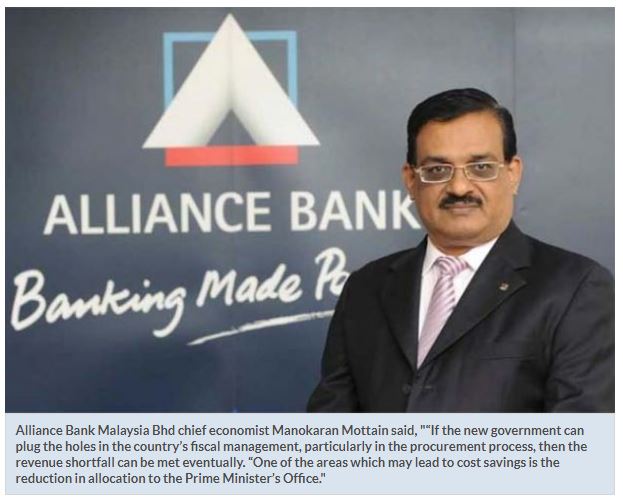Malaysia can meet fiscal deficit target even after GST is removed
PETALING JAYA: The audacious move by the Pakatan Harapan government to abolish the goods and services tax (GST) may not necessarily derail Malaysia from its fiscal deficit target, as feared by many economic pundits.
While credit rating agency Moody’s described the removal of the consumption tax regime as “credit negative”, several economists expect Malaysia to remain largely on track of its fiscal deficit target, provided the government fulfils its election promises for reforms in national expenditure.
Lower expenditure, coupled with higher crude oil prices and the re-introduction of the sales and services tax (SST), will be key in buttressing the national finances, moving forward.
According to Alliance Bank Malaysia Bhd chief economist Manokaran Mottain, the federal government may see a revenue shortfall of about RM5bil to RM10bil this year – even if the loss of revenue from the removal of the GST is substituted by the higher crude oil price and the re-introduction of the SST.
The previous government had projected a collection of RM43.8bil in revenue from the GST this year.
“If the new government can plug the holes in the country’s fiscal management, particularly in the procurement process, then the revenue shortfall can be met eventually.
“One of the areas which may lead to cost savings is the reduction in allocation to the Prime Minister’s Office (PMO), as the Pakatan government has pledged to reduce the function of the PMO and include fewer ministers there.
“A total of RM17.4bil was allocated to the PMO in Budget 2018, which was considerably high compared to the budget allocated to other departments,” he said.
Pakatan had said previously that cost savings of about RM20bil or 1.4% of the gross domestic product (GDP) could be achieved, given the reduction in wastage and corruption.
While he described the RM20bil target as “ambitious”, Manokaran indicated that the government could achieve savings close to the target, if unnecessary expenses can be identified and eliminated.
Since taking office after winning the 14th General Election, the new government has terminated the services of about 17,000 political appointees in the ministries as it tries to slash spending and introduce a leaner administration.
Fiscal consolidation measures are not new in Malaysia, as the previous Barisan Nasional government had sought to trim the country’s fiscal deficit, a measure of how much the national expenditure has exceeded revenue. Among the key measures were the GST and subsidy rationalisation, which were criticised for the rising cost of living for Malaysians.
With the fiscal consolidation move, Malaysia’s fiscal deficit has been brought down significantly from 6.7% in 2009 to 3% in 2017.
Under Budget 2018, the Barisan government had projected a fiscal deficit of 2.8% this year. On the other hand, in its 2018 alternative budget, Pakatan estimated a fiscal deficit target of 2.04% in 2018.
Pakatan plans to re-introduce fuel subsidies and remove the GST, while remaining steadfast to maintaining an effective fiscal management.
AmBank Group chief economist Anthony Dass thinks it is possible and estimates that up to 5% of the government’s operating expenditure or RM11bil can be saved on the back of fiscal expenditure reforms.
The savings, coupled with higher crude oil prices and the SST revenue, are expected to help offset the RM16bil shortfall after the abolition of the GST.
“In our analysis, if we assume there is hardly any focus on transparency, financial prudence, reduction in wastage, reducing corruption and better public service, the deficit is expected to swell up to RM51bil, which translates into a fiscal deficit of 3.5% of the GDP.
“However, based on the success story of Penang and Selangor under the Pakatan government, if we factor in a 5% reduction in operating expenditure through transparency, financial prudence, reduction in wastage, reducing corruption and better public service, the deficit will be around RM39bil to RM40bil, which translates to a fiscal deficit of 2.7% or 2.8% of the GDP,” he told StarBiz.
Meanwhile, Moody’s continues to see the removal of the GST as having a negative effect on overall revenue, amid the country’s fiscal strength, which is already a drag on its credit profile.
With the government’s revenue as a share of GDP falling gradually over the past five years to 16.7% at end-2017, Moody’s said in a statement yesterday that the abolition of the GST would further strain the ratio.
To put it in context, the revenue as a share of the GDP median among Moody’s A-rated countries – which include Malaysia – stands at 33.8%.
The rating agency pointed out that reforms on the expenditure side would play an important role in determining ultimate fiscal outcomes.
“These reforms include the reintroduction of fuel subsidies removed in 2014, but potentially reinstated to benefit lower-income groups. Another key expenditure priority in the Pakatan Harapan’s alternative budget released during its campaign and reiterated since its election victory is savings from a so-called reduction in wastage and corruption of RM20bil, or 1.4% of GDP.
“Higher oil prices are not a permanent substitute for the GST, and are not a reliable offset to lost revenue, given the volatility of prices,” it said.
Source: https://www.thestar.com.my/business/business-news/2018/05/23/malaysia-can-meet-fiscal-deficit-target/#WrWGg6XxLhJ4Ia49.99


 Thailand
Thailand




